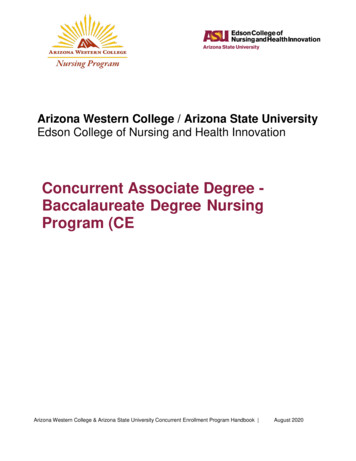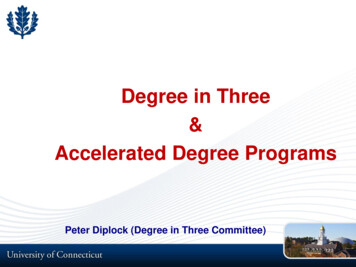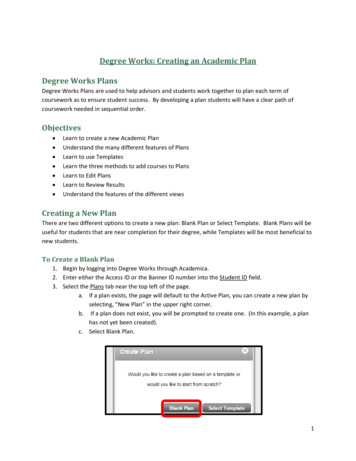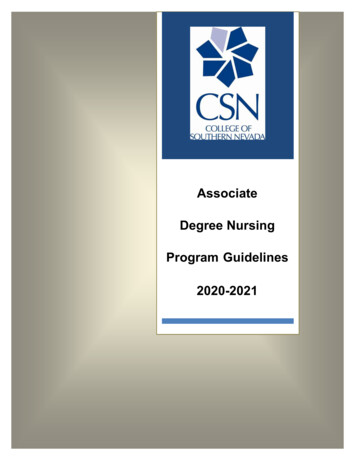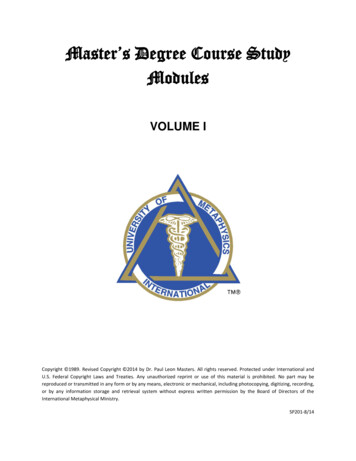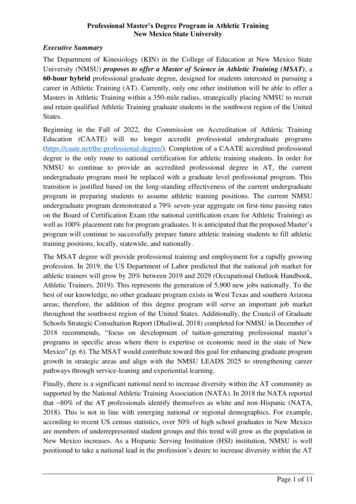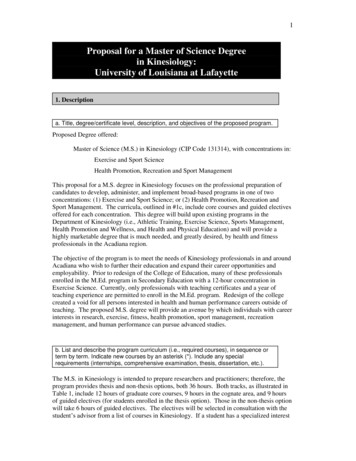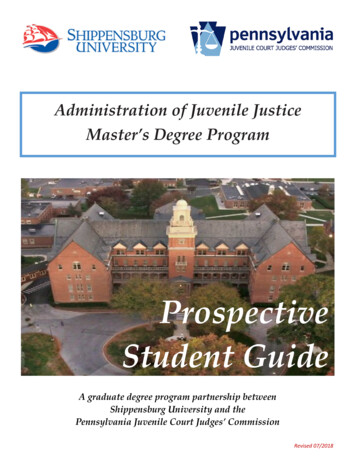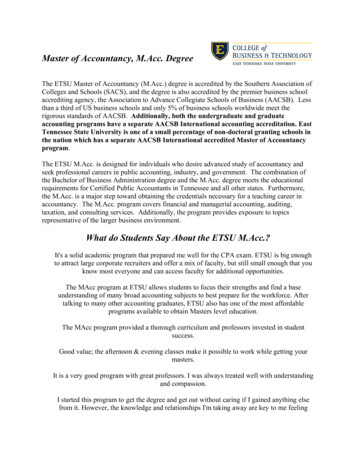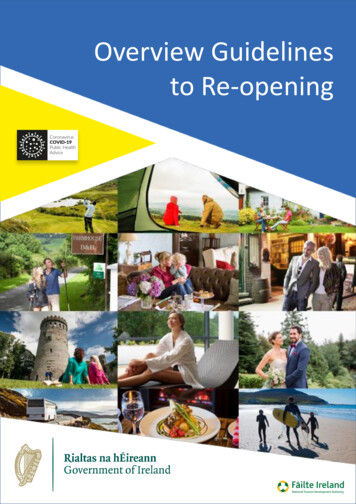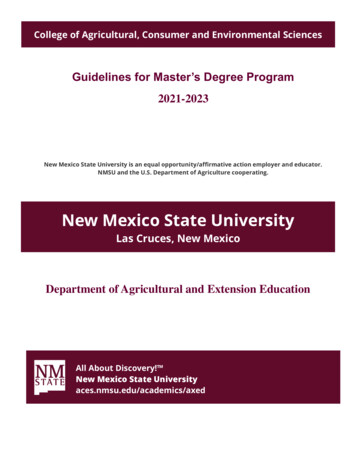
Transcription
College of Agricultural, Consumer and Environmental SciencesGuidelines for Master’s Degree Program2021-2023New Mexico State University is an equal opportunity/affirmative action employer and educator.NMSU and the U.S. Department of Agriculture cooperating.New Mexico State UniversityLas Cruces, New MexicoDepartment of Agricultural and Extension EducationAll About Discovery! New Mexico State Universityaces.nmsu.edu/academics/axed
Department of Agricultural and Extension EducationCollege of Agricultural, Consumer and Environmental SciencesNew Mexico State UniversityLas Cruces, New MexicoBox 30003, MSC 3501Las Cruces, NM 88003-8003Ph. (575) 646-4511Fax: (575) 646-4082aces.nmsu.edu/academics/axedDr. Frank Hodnett, Graduate Program CoordinatorDr. Steve Fraze, Department Head2
TABLE OF CONTENTSI.FORWARD5II.DEPARTMENT MISSION STATEMENT6III.DEGREE DESIGNATION6IV.PROGRAM PHILOSOPHY6V.COMMITMENT TO DIVERSITY7VI.ADMISSION TO THE PROGRAM7Admission RequirementsInternational StudentsMasters Accelerated Program (MAP)Admission Process and MaterialsGraduate School ApplicationDepartmental RequirementsTransfer of CreditsStatus of Admission778889910POLICIES AND PROCEDURES11Graduate AdvisorGraduate CommitteeCandidacy MeetingChange in Program SequenceFinal ExaminationTime RequirementsLeave of Absence/Continuous EnrollmentReturning StudentsGrade Policy111111121212121213DEGREE REQUIREMENTS13Plan OptionsCurriculum RequirementsNumbering of CoursesCourse LoadShort Courses and InstitutesCredit MaximumsDistance ClassesMinor Areas of Study1314151515151616VII.VIII.IX.GRADUATION163
X.FINANCIAL SUPPORT16Graduate AssistantshipsScholarships, Fellowships and Other Sources of Financial Aid1617XI.HOUSING17XII.ETHICAL CONSIDERATIONS17New Mexico State Sexual Harassment PolicyAmericans with Disabilities ActGraduate Student Appeals BoardAcademic Appeal ProcessCode of Conduct Statement1719191920XIII.AXED GRADUATE CLASSES21XIV.FACULTY & STAFF25Faculty in the DepartmentAffiliated Faculty in the DepartmentDepartment Staff252626APPENDICES27APPENDIX A – PREPARING TO GRADUATE28APPENDIX B – THE MASTERS ORAL EXAMINATION30APPENDIX C – AGRICULTURAL AND EXTENSION EDUCATIONMASTER’S DEGREE PLANNING SHEET32APPENDIX D – AGRICULTURAL AND EXTENSION EDUCATIONGRADUATE STUDENT CHECKLIST –THESIS OPTION34APPENDIX E – AGRICULTURAL AND EXTENSION EDUCATIONSTUDENT CHECKLIST – CREATIVE COMPONENT OPTION35APPENDIX F – GUIDELINES FOR AXED 595 - INTERNSHIP36APPENDIX G – GUIDELINES FOR AXED 490-INDEPENDENT STUDYAND 598-CREATIVE COMPONENT38APPENDIX H – GUIDELINES FOR AXED 599 – THESIS41APPENDIX I – GRADUATE STUDENT FORMS42XV.4
FORWARDWelcome to the Department of Agricultural and Extension Education at New Mexico State University!We are pleased with your interest in our program and look forward to talking with you about yourlong-term goals. Our department is student-centered, committed to program excellence and has a richtradition in graduate education. Faculty members provide leadership for program options in teachereducation; Extension staff development and training; preparation of professional educators inbusiness, industry, and government agencies; international development; communications andmechanization and systems technology. Each student's academic program is individually tailored tomeet specific educational goals and objectives under the guidance of the student's advisor and graduatecommittee.This handbook includes information specific to the AXED graduate program and is designed tosupplement information contained in the NMSU Graduate Catalog (http://gradschool.nmsu.edu).Additional questions and concerns can be addressed through individual interviews with facultymembers in the department.We invite you to explore the contents of this manual and to contact a faculty member if you haveadditional questions regarding the graduate program in Agricultural and Extension Education.5
DEPARTMENT MISSION STATEMENTPreparing and supporting educators and leaders in agriculture to improve the economic well-beingand quality of life of all stakeholders.DEGREE DESIGNATIONMaster of Arts in Agricultural and Extension EducationPROGRAM PHILOSOPHYThe Department of Agricultural and Extension Education encompasses the study of behavioral andapplied sciences, and leadership and management principles as they apply to the broad-based fieldsof agriculture. Among the major purposes of agricultural, extension, communication and technologyeducation is the application of knowledge, skills, and attitudes (dispositions) learned (in severaldifferent disciplines) to education, extension, and agricultural and technological problems. Theprinciples of teaching and learning as lifelong processes are utilized to educate for roles beyondthose of agriculturist and/or educator. The dissemination and application of the knowledge base by avariety of clientele is given specific attention.The programs of the department go beyond normal knowledge, skill, and attitude development inagricultural, extension, and technology education by developing understanding of: 1) thesignificance of agriculture and technology in a global society through the application of scientificand business principles and problem-solving strategies; and 2) the interdependence and closerelationships between agricultural industries and other significant businesses interwoven with thesocial and economic structure of the community, state, nation and world. The programs placeemphasis on food and fiber systems; family systems; environmental issues; economic developmentissues; technological systems; and the development of the individual, communities, organizations,and organizational networks.The study of agricultural, extension, communications, technology education, and communitydevelopment focuses on the needs of both individuals and groups. Curricula that developindividually satisfying and socially responsible knowledge, skills, and attitudes are offered, utilizingproven formal, non-formal, informal, and self-directed instructional methods including experientiallearning, problem solving, and cooperative learning.Agricultural, extension, communications and technology education focuses on, but is not limited to,the preparation of educators, and communicators to assess needs and to plan, administer, andevaluate educational programs in the areas of agricultural products and processing; forestry;horticulture, environmental concerns, conservation and natural resources; engineering,mechanization, technology and technological systems; supply and service, economics, marketing,communitcations and business development; production of food and fiber; and leadership andpersonal development. The department recognizes that our global society is changing rapidly andsignificantly and the reassessment of program goals and objectives must be continuous. To this end,the department is characterized by flexibility and adaptability in an attempt to assist students andothers in coping intelligently with a dynamic educational setting.6
Students cannot foresee the exact competencies that will be needed to respond to future demands,but they can be assisted in the development of knowledge, skills, and attitudes that will meet futurechallenges with creativity and vision. It is to this end that the department structures its curricula andprogram delivery strategies. Such a focus recognizes the value of and relies heavily on experience asthe context in which knowledge, skills, and attitudes are learned. Agricultural, extension,communications, and technology education have relevance to a general audience (K -Adult) and isoriented to providing life-long learning opportunities in and about agriculture and technology toeveryone interested in the collective role of the industry. Both international and domestic dimensionsare fulfilled through collaborative efforts between the department, clientele, and affiliatedstakeholders including business, industry, and governmental agencies; agricultural and farmerorganizations; community groups; public schools, community colleges, and universities; and othercenters and units organized to deal with the contemporary complexity of agricultural, extension, andtechnology education.COMMITMENT TO DIVERSITYNew Mexico State University (NMSU) and the Department of Agricultural and Extension Educationis dedicated to non-discrimination and equal opportunity in education and employment incompliance with state and federal laws that prohibit discrimination on the basis of race, color,national origin, ethnicity, gender, gender identity, sexual orientation, spousal affiliation, physical ormental disability, serious medical condition, or veteran status. NMSU’s dedication to nondiscrimination extends to recruitment, admissions, education, scholarships and other tuitionassistance, social and recreational programs, hiring, promotion, training and other employee actionssuch as work assignments, compensation, benefits, transfers, layoffs, and terminations. Additionally,NMSU's mandated affirmative action plan is evidence of our dedication to excellence in everythingwe attempt to accomplish. For additional information, please, contact the Institutional Equity Officeat New Mexico State University located in the O’Loughlin House. The phone number is (575) 6463635.ADMISSION TO THE PROGRAMAdmission RequirementsTo be admitted to the graduate program in Agricultural and Extension Education, the student musthave a baccalaureate degree from an accredited college or university with an academic record thatclearly demonstrates ability to pursue graduate studies in this field. As a general rule, applicants willnot be admitted to the program unless they have a 3.0 (out of a possible 4.0) cumulative point-hourratio for all previous academic work, though the records of potential students will not be examinedstrictly from an academic perspective. Students with a GPA of 2.5-2.99 may be considered foradmission on a provisional status (see page 10).International StudentsISS (International Student Services) is responsible for coordinating the application and admissionsprocess for all international applicants, overseeing international students’ maintaining their legalstatus as foreign students in the United States, and coordinating outreach programs which benefit ourcampus and local community. International students must apply for admission through ISS by7
completing the “International Application for Admissions” form and paying the nonrefundableapplication fee of 50. You can request an application or information from ISS at the followingaddress: International Student Services, MSC 3567, New Mexico State University, P.O. Box 30001,Las Cruces, NM 88003-8001, USA. The phone number is (575) 646-2017 and the fax number is(575) 646-1517. The e-mail address is ias@nmsu.edu. These materials are also available online er’s Accelerated Program ProcessNew Mexico State University master’s accelerated program provides the opportunity foracademically qualified undergraduate students to begin working on a master’s degree during theirjunior and senior years while completing a bachelor’s degree.Undergraduate students may apply for acceptance to a Master’s Accelerated Program available atNew Mexico State University after completing 60 semester hours of undergraduate coursework ofwhich a minimum of 25 semester credit hours must be completed at New Mexico State Universityand apply toward the undergraduate major. The grade point average must be at a minimum of 3.0;departments participating in the master’s accelerated program may have requirements that exceedthese minimum standards.Final admission and acceptance into the graduate program is based on academic performance at theundergraduate level and completion of the eligible undergraduate degree. In addition, applicants tothe master’s accelerated program must meet all other requirements as specified by the acceleratedprogram. Acceptance into the MAP does not guarantee acceptance into the AXED graduateprogram.Admission Process and MaterialsThe AXED Graduate Studies Committee reviews each application and decides whom to admit intothe master's program. Master's degree students are admitted each semester.The committee will consider only those applicants from whom all of the admission materials havebeen received. It is the applicant's responsibility to ensure that all materials are received to meetgraduate school and departmental requirements. Each prospective student should have an applicationform and transcripts on file with Graduate Student Services approximately four months in advance ofthe desired enrollment date in order to ensure timely consideration of the application. Failure toobserve this deadline may delay action until the following semester. Applicants can expedite theprocess by doing the following:1. Graduate School Application: On your Graduate School Application, select theDepartment of Agricultural and Extension Education as your department of interest. Yourcompleted application (must be submitted online .html) and official transcripts from allinstitutions of higher education previously attended should be sent to:Graduate Student ServicesNew Mexico State UniversityPO Box 30001, MSC 3GLas Cruces, New Mexico 88003-8001Phone: (575) 646-27368
If your current/previous university is an eScrip-Safe Network member, the fastest way tosubmit your transcripts is electronically via the eScrip-Safe format. To do so, order throughyour current/previous university registrar's office. A 50 non-refundable application fee mustaccompany all applications.2. Departmental Requirements: The Department of Agricultural and Extension Educationrequires the following items for admission:a. Letter of Application: the two-page letter of application should clearly identifyyour professional and career goals as well as reasons for pursuing graduateschool and a Master’s degree in Agricultural and Extension Education. The lettershould be typed and double-spaced.b. Letters of recommendation: you should request three (3) letters of reference fromindividuals who know you well enough to comment on your professional skillsand abilities as well as your ability to complete graduate-level academiccoursework. Letters of reference must be obtained from individuals outside ofthe AXED department. Standard recommendation forms are available from thedepartment, but references can submit or attach a personal letter.All materials requested by the Department of Agricultural and ExtensionEducation have to be submitted online with your application.c. Personal Interview: upon receipt of all application materials, a personal interviewmay be required at the discretion of the Graduate Studies Committee and/or thedepartment head.All information is considered in its totality in the admissions process. Each applicant is considered interms of whether it appears he or she will be able to successfully complete the program and make acontribution to Agricultural and Extension Education.Transfer of CreditsA student may transfer graduate credits taken at NMSU as well as graduate credits from anotheruniversity to New Mexico State University, provided the credits were earned from an accreditedinstitution and the student was admitted as a graduate student at that institution. Transferredcoursework (grades and hours) is maintained separately from NMSU coursework.Students desiring to transfer graduate credits should submit a letter to the AXED department headrequesting the transfer of credit, the course syllabi, and a transfer of credit form by the end of thefirst semester of enrollment. The AXED department has the responsibility to accept or reject anynumber of transferred credits based on such elements as whether the work fits into a logical programfor a degree, if grades of A or B have been earned in the courses proposed for transfer, and any otherelements it deems relevant. Credit granted for work done at another institution is tentative untilproved by satisfactory work in residence, and the AXED department may also require work to bevalidated by examination. At the master's level, students must take at least 50 percent of thecoursework required for the degree from faculty of New Mexico State University to meet theresidency requirements for their degree. Transfer credits must meet the same time-limit requirements(seven years) as graduate classes at accredited universities. Coursework taken elsewhere after9
initiation of Graduate School at NMSU must have prior approval of the AXED department head andthe dean of the Graduate School if such work is to be transferred. Such coursework must also betaken as a graduate student at that institution. All requirements as to accreditation, level, grades, andother elements described for initial transfer work will apply.“Request for Transfer of Credit” forms are available in the Graduate School office and on the Web egree students who have been advised by an AXED faculty member and are applying foradmission to graduate school need only submit the transfer of credit form if accepted into thedepartment.Status of AdmissionAXED graduate students may be admitted on a regular or provisional basis. A regular student isdefined as a student working toward an advanced degree whose scholastic record is satisfactory.This includes: (a) a beginning graduate student who has either an overall 3.0 grade average or agrade average of 3.0 in the last half of undergraduate work; (b) a continuing graduate student whomaintains at least a 3.0 average in graduate courses; and (c) a beginning international graduatestudent who has an overall 3.0 grade-point average or continues to make a 3.0 grade-point average(or its equivalent), a bachelor's or master's degree from an approved institution, and no Englishlanguage deficiencies.Provisional students are individuals seeking an advanced degree whose scholastic record is notentirely satisfactory. Provisional students are classified as: (a) a continuing graduate student whosecumulative grade-point average at the end of any semester is less than 3.0; (b) a beginning graduatestudent who does not have an overall 3.0 grade point average or 3.0 in the last half of undergraduatework, but does have at least a 2.5; (c) a beginning graduate student so designated by the admittingdepartment because of an excess of deficiencies; and (d) a beginning graduate student who hasqualified for admission by taking nine graded graduate hours as a non-degree student. Provisionalstudents must complete the first three courses (totaling at least 8 credits) of graded graduate workwith an average of at least 3.0. A provisional student who does not meet the 3.0 grade-point averagemay be subject to dismissal.Non-degree students below the provisional status requirement will be enrolled through theCollege of Agricultural, Consumer and Environmental Sciences. To be eligible for consideration foradmission into the AXED graduate program by the departmental Graduate Studies Committee, youmust register for and pass AXED 556: Research Methods, with a grade of B or higher and completethe requirements of the Graduate School. An interview with the Committee may also be convenedas part of the admission review process.Post baccalaureate non-degree program students wishing to take courses in Agricultural andExtension Education will be advised as needed. However, these students will be recognized ascourtesy students and not as members of the graduate or undergraduate programs in Agricultural andExtension Education. They are encouraged to apply to the graduate program as soon as possible andshould realize they can transfer a maximum of nine approved graduate credits taken as a non-degreestudent into a graduate program. Under no circumstances will non-degree program studentswishing to make up coursework deficiencies for teacher licen
New Mexico State University master’s accelerated program provides the opportunity for academically qualified undergraduate students to begin working on a master’s degree during their junior and senior years while completing a bachelor’s degree. Undergraduate students may apply for acceptance to a
